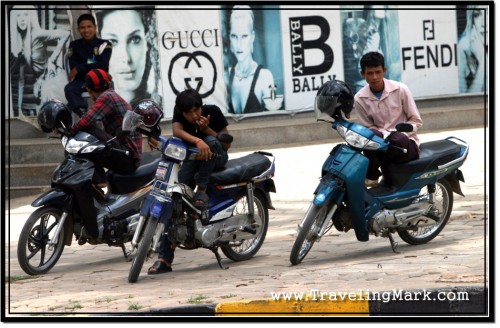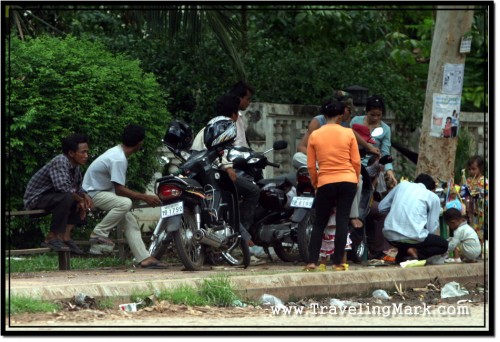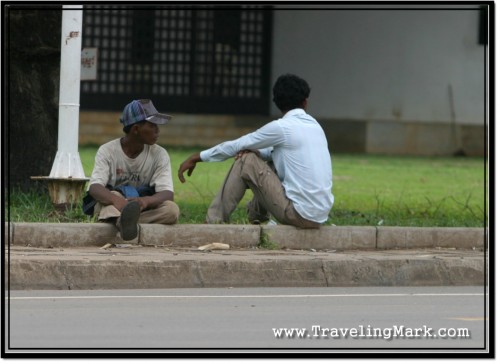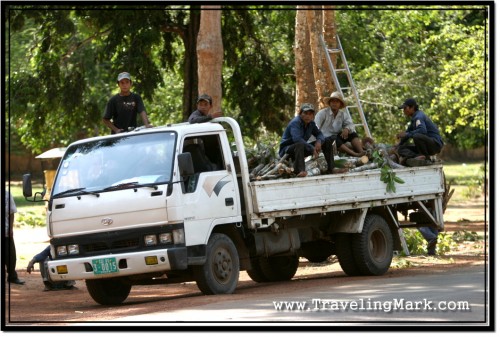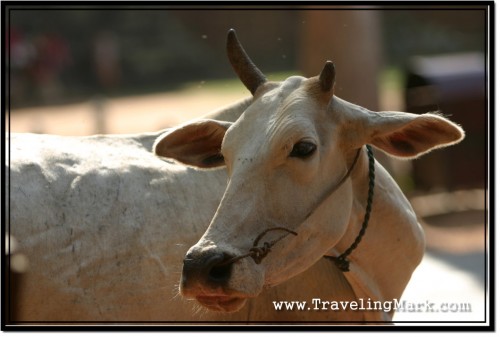I am an advancing personality and as such I understand that the surest way to advance in life is by enhancing the lives of others. The trick is in the fact that there are two types of enhancements:
- Forward Enhancements
- Backward Enhancements
I take honest pride in enhancing people’s lives by advancing them with forward enhancements. A forward enhancement doesn’t care whether you make the receiver feel good or feel bad. Feelings enticed by such actions are always temporary and should come secondary to the higher purpose – the ultimate goal. Did your actions in the end get your target group to the desired destination or did you end up stuck with perceived added value? Do your actions offer temporary feel good experience which, like drugs delivers temporary illusion of positive feelings only to put the life in serious danger when the effects wear out?

Being the most truthful travel blogger in the world, I take a lot of heat from the self righteous protectors of the impoverished people for calling a spade a spade. Take Cambodia for example. Pointing out that Cambodians are lazy and dangerous resulted in a lot of hatemail sent to me by people suffering from fear of reality. These delusional people mean good, but their actions result in naught more than False Enhancements in the lives of Cambodians. The self righteous defenders of Cambodian reputation are like that drug I spoke about earlier. They wanted to help alleviate Cambodian poverty so they gave Cambodians a fish (to use the Bible reference). In their eyes, providing hungry people with fish enhanced their lives. In reality, this presumed step forward was a two steps backwards.
Example of False Enhancements
The result of providing impoverished people with false enhancements is the dependence. Dependence is inability to provide for themselves and that is a perfect set up for a disaster. Let me give you an example – when I was visiting the tropical island of Langkawi in Malaysia, I was tempted to take a boat tour through the mangrove but ended up never taking it because all tour operators and all boatmen combined the tours with “eagle feeding”. Basically, tourists would be loaded into a boat which would head towards the ravine where wild eagles nest. Then in order to provide the tourists with an unforgettable experience, the boatman would throw the eagle soaring around a fish so the eagle comes within the reach of tourists in the boat.
Needless to say, all tourists would end up in awe, which is what the boatman wants because it fills up his pocket with cash. It’s a business I was not willing to support even if I were the only person in the world who would not participate in this activity. What this eagle feeding does, is that it causes dependency and dependency, as mentioned above is a very solid step towards losing the ability to provide for themselves. If this eagle feeding continues, the eagles will get used to the fact that each time a boat shows up, all they’d need to do is come to it and they’d get food. Day after day, their feeding ritual would change from catching their own fish into flying towards boats and if it doesn’t stop, eventually they would lose the ability to catch fish. Then if something happens (and that can easily happen) and boatmen can no longer come, the eagles will be left without food and with lost ability to feed themselves, they’ll die.
And this is what False Enhancements are all about. To a reality fearing mind, feeding eagles may seem like a noble cause. “Poor wild animals have tough time catching fish, so we helped them to survive, right?” I truly understand how some could come to such conclusions and seeing the reactions of the self righteous protectors of the Cambodian people to me instating the True Enhancements in Cambodia only confirmed how gullible much of the population is.
Two Types of People
There are two types of action takers, both sharing the same, honest desire to enhance the lives of impoverished people, but each taking a different approach to it. The types of people are:
- Backward Thinkers – The Self Righteous Protectors who Help People By Providing Them with Fish Instead of Teaching Them How to Fish and by Attacking the Forward Thinkers for Taking Seemingly Unpopular Actions
- Forward Thinkers – People Who See Past the Point of Their Noses And Address the Issue by Actions That Lead to Resolution, Even If They Cause Temporary Discomfort. Forward Thinkers Focus on Bigger Picture and Achievements of Ultimate Goals, Not Temporary Feel Good Experiences
Let’s take a closer look at how much each of the two types of action takers enhances the lives of impoverished people:
Backwards Thinkers
There is no doubt that the backwards thinkers mean well. In their divine delusion, they are the ones who step up and speak on behalf of the impoverished. They are in the front line when it comes to attacking people like me who dare to speak badly about the impoverished. They are also in the frontline when it comes to helping the impoverished the way the impoverished want. But where does this type of help lead?
Well, let’s take a look at Cambodia again for it’s a good example. Where did the impoverished people get after 30 years of assistance by the backwards thinkers? Yeah… 30 years after the end of the Khmer Rouge rule, and after 30 years of being given handouts on daily basis, the lives of average Cambodians have not approved one bit. I can guarantee you that if backward thinkers continue enhancing the lives of Cambodians backwards, like they have for the past 30 years by encouraging the culture of handouts and attacking forward thinkers for addressing the real issue and encouraging the real change even if it requires slaps on someone’s wrists, we’ll look at what has changed in the next 30 years and we’ll see nothing. Backwards enhancements, the ones practiced by backward thinkers set the impoverished two steps backwards.
30 years is more than enough to achieve a real change – for as long as the backward thinkers are kept at bay so forward thinkers can enhance the society forward without hindrance by the backwards thinkers. Look at Japan, for example. The country was destroyed after World War II and found itself in far more desperate state than Cambodia was after the Khmer Rouge rule, but backward thinkers were restricted from slowing progress down, forward thinkers were put in charge and 30 years later, Japan was an economical superpower. If what backward thinkers do had the potential to change Cambodia around, it would have already happened now that they’d been providing their assistance so relentlessly for 30+ years.
I cannot however deny the good intentions of the backwards thinkers. Sadly, stupidity, even if performed with the best of intentions is the core of hindered progress. A wise man once said that a hyperactive idiot is worse than the enemy of the state. And it’s true. In their bid to do good, backward thinkers rush into “helping” the poor while throwing roadblocks before the feet of the forward thinkers, ultimately hindering the process of enhancement. There is no bigger obstacle to progress than a dedicated moron who can’t see the forest for the trees and relentlessly enforces his/her own backwards agenda.
Forward Thinkers
There is only one shortest distance between two points. And that’s the path the forward thinkers take. Not only does it lead to the finish, it gets you there faster than any other way. As a wise man once said, sometimes you need to lose the battle to win the war. That’s why backward thinkers can never be good generals. They do not have the ultimate goal in mind and focus merely on temporary feel good experiences. They’d focus entirely on winning that battle even if in the end they’d lose the war. Unpopular steps must sometimes be taken so the greater good can be achieved. Forward thinkers take these steps, even though it makes them unpopular in the eyes of the backward thinkers who would not hesitate to assault them.
Despite the looming threat of the attacks by the backward thinkers, forward thinkers won’t give in to their backward thinking and will do all in their power to move the society forward. Roadblocks set by the backward thinkers will ultimately slow the progress down (or completely halt it, in some cases), but without forward thinkers, we would have never gotten anywhere as humans. They are the ones who achieve real results because they are not afraid to think outside the box (Eppur si muove!) and take steps that lead to ultimate goals, even if it creates temporary hardships along the way.
While backward thinkers fight to alleviate poverty by encouraging and deepening the culture of handouts and attacking the forward thinkers for speaking up against it, the forward thinkers understand that the real problem lies somewhere else and must be addressed, even if it requires a slap on the wrist. Take inherent laziness of Cambodians for example. A forward thinker would tell the Cambodians that many of their problems are a result of laziness and would tell them to stop being lazy slacks and start taking responsibility for their lives. A backward thinker, on the other hand would instantly attack the forward thinker for saying things like that and would back Cambodians up saying that they have a difficult life and have gone through a lot, are still recovering from the past and need all support they can get.
Fact be told, the Cambodians don’t need any more support. They got more than too much of it for the past 3 decades and it got them nowhere. They need someone to kick them in the backside and tell them that in today’s information age everyone has equal opportunity to make decent living. Internet gurus earn upwards of 6 figures and can be found in India, Ukraine, Romania, Egypt, and many other countries. Internet creates a level field for everyone so the excuse of living in a poor country simply will not stand. The trouble is that because the internet provides the level field for absolutely everyone, the competition is rough as whole world, down to the last country you didn’t even know existed is your competition. As a result, in order to make it, one needs to work on it daily and constantly grow and improve. And that won’t work if you’re a lazy bum.
Difference Reiterated
I have said it before but it must be said again: backward thinkers feel sorry for Cambodians, give them handouts and attack everyone who speaks badly about them. Forward thinkers tell Cambodians that they are responsible for their own lives and that if they are poor, it’s their own doing because anyone who doesn’t suffer a mental illness has everything they need to make it and have an abundant and fulfilling life.
The problem, as I have personally experienced, is in a fact that backward thinkers are such a loudmouthed congregation of delusional individuals, the presence and actions of forward thinkers are overshadowed and often suppressed by cocky backward thinkers who believe their poop doesn’t stink. As a result, forward thinkers often choose to keep to themselves so they don’t have to put up with the abuse by holier than thou backward thinkers which gives the backward thinkers an impression that everyone does it their way hence it must be the right way.
You don’t have to go too far to see what it does to their ego to have someone go against their religion, address the real issue and call a spade a spade. And imagine how much effort it’s going to take to undo all their actions to start enhancing people’s lives forward, not backwards. I tried in Cambodia, but the damage done by the backward thinkers is so deep rooted, it’s gonna be a major challenge to revert.
I knew that the way out of their misery is for Cambodians to obtain computer skills and market themselves to worldwide audiences on the internet. Regardless of how poor and deprived of opportunities they may feel living in their homeland, it all matters not once they get on the information superhighway. But there was a problem which goes back to the damage done by the years of backward enhancements.
Instead of listening to me and trying to learn a thing or two to actually achieve a change in their lives, the Cambodians I was able to argue into going to the internet cafe with me spent the entire time in chatrooms. Switching between half a dozen chat windows to waste time talking useless crap with random internet acquaintances was more appealing to them than the ability to learn something that could generate them an income comparable to that the people from the western countries earn.
Like eagles on Langkawi, Cambodians know that all they need to do is flock around foreigners when they come to sight and they’ll get stuff for free. Why would they bother studying to gain qualifications which could land them with above average income if all they need to do is a bit of whining and free stuff falls into their laps?
30 years of pampering by the backward thinkers left Cambodians completely uninterested in taking charge of their lives. As I had said many times before, backward thinkers enhance the lives of the impoverished people backwards. They think they move them one step forward, but in reality they set them two steps backwards. They usually do that with good intentions but intentions are useless if the end result is backward movement. Had people listened to harsh, but forward enhancing words of forward thinkers, instead of attacking them, Cambodians would not be this used to getting handouts and unwilling to take charge of their lives on their own.
Things need to be called for what they are, without beating around the bush. There is no polite way to address a lazy person but by calling them lazy. Unless the laziness is acknowledged as such, no attempt will be made to overcome it and set sail for a change. Forward thinkers tell lazy people that they are lazy. Backward thinkers attack forward thinkers by calling them racist bigots for having the audacity to call lazy people lazy.
Conclusions
Cambodians are poor because even though they feel that there is a way out, they are unwilling to put forth the effort necessary to find that way and travel it. And the reason they don’t have that will is because over the decades, they’ve been pampered by the backward thinkers who enforced the notion that accumulating their own wealth was unnecessary. Forward thinkers knew that in order to set them off on that way, they’d need to be kicked down that road. Gently pushing them did not work. They were embedded in their lazy seats so tightly, it delivered no result. A mighty kick was necessary if the ultimate goal of following the road to self made riches was to be accomplished but backward thinkers would immediately step in and attack the forward thinker for kicking a Cambodian. How racist of a forward thinker, isn’t it?
What backward thinkers don’t realize is that the poor don’t need charity. They need inspiration. Unfortunately, actions of backward thinkers, if allowed to perform for a long enough time can kill people’s inherent desire to follow up after they’ve been motivated. When it gets to that stage, simply inspiring people will land little change. Harsh action is then required, oftentimes no lesser than a mighty kick in the backside or a pretty loud slap on the wrist.
Charity only provides the poor with a fish to keep them alive in their raggedness, or to make them forget that they are poor for an hour or two, but wrist slapping action can cause them to rise out of their misery and set on the path to a better life. Anyone wishing to really help the poor is hereby encouraged to enhance their lives forward, not backwards. It is not hard-hearted or unfeeling, as it is not racist or bigoted to bitch-slap an impoverished person if in the end it breaks their poverty cycle. Backward thinkers pity poverty, forward thinkers kick it in the arse. Which one are you?

